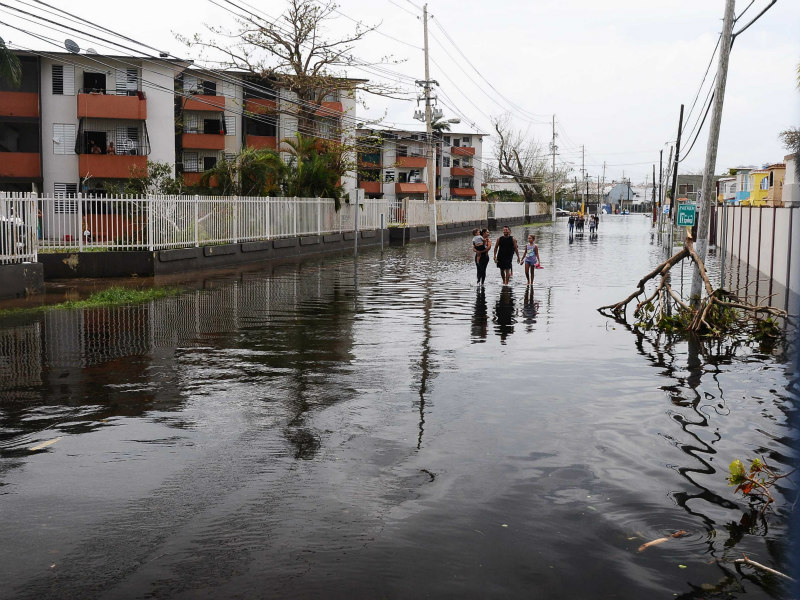Diana Marszalek 12 Oct 2017 // 1:00PM GMT

After a succession of natural disasters, big business was noticeably slower providing aid to Hurricane Maria-ravaged Puerto Rico than to the mainland US cities affecting by destructive storms just weeks before, according to industry watchers.
"Companies were late to the game," said Scott Beaudoin, RF/Binder’s chief strategy officer, amid harsh criticism of the American federal response to the September storm, which has left much of the island territory without food, clean water and power. "They could have done more."
According to Beaudoin, a CSR expert, a host of big-league corporations have responded to the devastation, which put Puerto Rico at risk of a major humanitarian crisis, by offering various forms of assistance. Amgen, Bacardi and Walmart are among the biggest donors, each making multi-million dollar pledges. Airbnb, Jet Blue, Tesla, and UPS have provided supplies, as well as help deliver them.
The problem, he said, is that business as a whole has provided far less aid to Puerto Rico than it did to Houston after Hurricane Harvey. As of October 6, corporate donations for Hurricane Maria relief totaled roughly $32m, versus the $270m in the wake of Harvey.
"That is a huge difference in monetary support," Beaudoin said. An influx of goods without the means to distribute them, and a deficient government response has compounded the problem, he added.
Why big business didn’t deliver to Puerto Rico the way it did for Houston depends on whom you ask.
CSR leaders say there could be a range of emotional factors at play, including the politically charged discord that has surrounded the larger issue of Hurricane Maria relief. It is notable, for example, that several industry CSR executives declined to comment for this story, citing political sensitivity.
Critics have charged that the federal government’s response to Puerto Rico was fraught, providing too little too late as the decimated island neared humanitarian disaster. The widespread reproach, including claims that Maria would be 'Trump’s Katrina,' has led to sparring in the media and on Twitter.
President Trump lashed out against San Juan mayor Carmen Yulin Cruz after she criticized the government’s "inefficiency." During a visit to the island, he said Puerto Ricans should be "proud" of a death toll lower than those of similar disasters.
Meanwhile, others point to a corporate mental block of sorts that separates Puerto Rico from the 50 United States (Puerto Ricans are natural-born US citizens but can’t vote in federal elections).
Emily Hunt, managing director of new consultancy 36ns, said she believes corporations’ relatively tame response to Maria is rooted in the lacklustre actions of the government, which left businesses without the kind of guidance that typically mobilizes relief efforts.
"Usually when disasters strike, the government, and FEMA, in particular, lead and coordinate the efforts of everyone – private groups as well as government agencies – who want to help," Hunt said. "But in this case, there’s been a massive lack in leadership."
Congress hasn’t rushed to approve relief efforts, either, noted Hunt, which she puts down to political apathy about Puerto Rico's fate.
"The plain reason for all of this in my opinion is Puerto Rico doesn't matter to the political calendar. It isn't somewhere that is key come primary time. No one runs for president in Puerto Rico. As a result, they are absolutely suffering from taxation without proper representation," Hunt said. "Were a tornado to strike Iowa or a hurricane to decimate New Hampshire like this, there is no way that the next generation of presidential hopefuls would allow such places to languish this long."
Corporate footprints also factor into CSR initiatives, according to leaders in the segment. That could account for Jet Blue’s 35-pronged Hurricane Maria relief effort, called 100X35JetBLue, aimed at providing immediate help as well as long-term support such as replenishing vegetation and developing a plan to spur economic growth. But that could also keep corporations without a vested interest in the island at bay.
Logistical concerns, heightened by images of Puerto Rico’s hurricane-wracked infrastructure, likely played a role in delaying aid, as corporations hesitated to donate money or supplies until they knew it would arrive and be delivered safely.
And the rapid successions of recent disasters (hurricanes Harvey, Irma and Maria hit within four weeks of each other) may have caused some businesses to slow the pace of mobilizing relief, if only because it’s been hard to keep pace, said industry veteran Joe Favorito.
"I don’t think you can call it fatigue, but (it is challenging) rushing from place to place trying to figure how to help," he said. "You have multiple disasters but a limited amount of money and a limited amount of time."
Beaudoin, however, thinks corporations could address that issue by taking steps to mitigate natural disasters rather than just reacting to them.
"What business should do is think about how they, as businesses, actually can prevent climate change from igniting all these super-cyclonic storms that are devastating islands," he said. "Nothing is going to happen in the world of social and environmental need unless companies are involved."
It is also incumbent on large-scale companies with deep pockets to help disaster victims regardless of where they live or consume their products, Beaudoin said. "The social purpose should transcend borders in times of great needs."
Yet, as Favorito said, businesses should be more savvy about the long-term upside in terms of building stronger relationships via their CSR efforts. "Down the road, companies will be rewarded," he said.
"The smart ones are the ones that realize the impact not just on their PR but also the Latino spend in this country, and the value of that audience going forward," Favorito said. "And that’s an audience that needs support."


































.jpg)


















